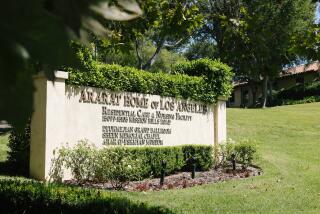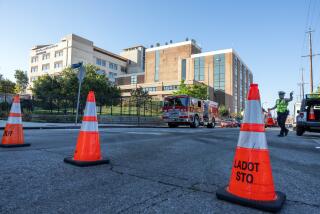Two more hospitals report CT scan radiation overdoses
- Share via
Two California hospitals where patients were exposed to excessive levels of radiation during CT scans had programmed their scanners according to the manufacturer’s specifications, officials at both hospitals said.
Los Angeles County-USC Medical Center and Bakersfield Memorial Hospital are the latest additions to a list of California hospitals where overdoses occurred during CT brain perfusion scans.
In both cases, the scanner in question was made by Toshiba.
“We called Toshiba to give us the protocol,” said Dr. Stephanie Hall, the chief medical officer at County-USC, where two patients received overdoses shortly after the hospital began doing the scans last fall. “We used that one.”
In Bakersfield, 16 patients received excess radiation “although the dosage guidelines provided by Toshiba were strictly followed,” the hospital president, Jon Van Boening, said in a prepared statement.
Toshiba issued a statement Monday saying it “cannot comment on specific cases” because of an investigation underway by the U.S. Food and Drug Administration. “We continue to work with all of our customers to educate them on the dose reduction technologies that we provide on our CT systems,” it added.
In any case, the hospitals are unlikely to be absolved of responsibility. L.A. County health officials who investigated the County-USC overdoses concluded that the technologists were not paying attention to dose levels during the scans, according to a state “notice of violation.”
“Reference dose information is included on the computer monitor screen, but the technologists had not been trained to observe or track the reference doses indicated,” the filing said.
The Times reported last year that over an 18-month period, more than 260 patients at Cedars-Sinai Medical Center received up to eight times the normal radiation from a General Electric scanner.
Cedars-Sinai officials cited confusion over setting the computerized instructions that control the radiation dose and scan quality. The overdoses began after the hospital had reprogrammed its machine. GE has held that nothing was wrong with the scanner.
At least 44 more overdoses were then discovered at Glendale Adventist Medical Center, which also used a GE scanner, and at Providence St. Joseph Medical Center in Burbank, which uses a Toshiba model.
Patients at Huntsville Hospital in Alabama were also exposed to excessive radiation — from a GE scanner.
All of the overdoses involved only brain perfusion scans — which are used to quickly diagnose strokes by examining blood flow in the brain — and not the dozens of other types of CT scans.
The discovery of the problem last year caused the FDA to issue an alert to hospitals nationwide to check the settings on their scanners. The agency also imposed new safety controls on medical imaging devices and called for the development of more precise dosing standards.
Experts believe that the problem occurred at more hospitals than those that have been identified. An FDA spokesman said Monday that the agency hopes to complete an investigation into the overdoses in the next few months.
alan.zarembo@latimes.com
More to Read
Sign up for Essential California
The most important California stories and recommendations in your inbox every morning.
You may occasionally receive promotional content from the Los Angeles Times.














